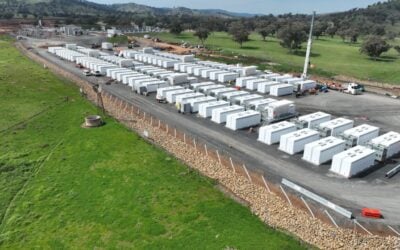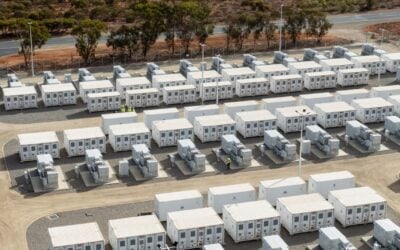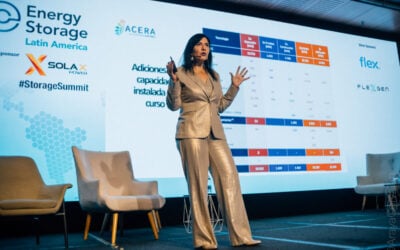Cutaway of a Nissan Leaf, including battery, at a trade show. Image: wikimedia user: Tennen Gas.
So-called ‘second life’ batteries taken from Nissan’s Leaf electric vehicle (EV) will be deployed in commercial-scale energy storage systems in regions including the US, following a deal involving Green Charge Networks.
The first installation is to be put in this summer at a Nissan facility. It is expected to help the company mitigate peak demand for the facility’s energy use, as well as providing some degree of grid balancing services. In a statement announcing the project Green Charge Networks also played up the possibilities of using the storage to integrate renewables, although further details have not been issued at this stage.
Green Charge Networks is among those offering demand charge reduction using energy storage to commercial customers, allowing them to reduce their electricity bills. Others operating in the space include Stem Inc and residential PV installer SolarCity’s diversification into commercial storage. Green Charge Networks currently offers storage on a no-money-down model.
Nissan and Japanese trading company Sumitomo Corp have been researching the possible use of Leaf batteries for non-EV use since 2010, the year the EV was launched, in Japan, the US and Europe, through a joint venture (JV) called 4R Energy. Around 178,000 Leafs have been sold to date, meaning it is thought to be the top-selling EV in the world, although this may not include recent data on China’s booming, part-subsidised electric car market.
Try Premium for just $1
- Full premium access for the first month at only $1
- Converts to an annual rate after 30 days unless cancelled
- Cancel anytime during the trial period
Premium Benefits
- Expert industry analysis and interviews
- Digital access to PV Tech Power journal
- Exclusive event discounts
Or get the full Premium subscription right away
Or continue reading this article for free
Green Charge will contribute its business model and its energy management software to the equation, claiming the prices it can offer represent significant cost savings over similar technologies. The business model, Power Efficiency Agreement sees Green Charge install, own and operate their storage projects, branded Greenstations by the company. Through the no-money-down deals, Green Charge shares the savings made by its customers on their power bills.
Meanwhile, numerous efforts are being made by partnerships between EV makers and various players in energy storage and related businesses for the reuse of batteries, including efforts by BMW in the US and in Europe.
PV Tech Storage recently conducted an in depth interview with UK company, Future Transport Systems, which is looking at giving second life batteries a home in rapid charging stations. The company’s chief Matthew Lumsden talked through many of the potential opportunities – and barriers – to the most effective use and re-use of batteries. While some analysts are sceptical that the market will be a niche at best, there is thought to be a consensus that synergy with EVs can help fuel the growth of the stationary storage industry, including making big, shared strides on cost reduction.
Vic Shao, CEO of Green Charge Networks, said the deal with Nissan was “extremely important to the distributed energy storage industry”.
Director of 4R Energy in the US, Brad Smith, pointed out that Nissan expects to be able to reuse “a majority of LEAF battery packs in non-automotive applications”.
Green Charge Networks CEO Vic Shao at a 2014 press conference. Image: Green Charge Networks facebook page (cropped).





